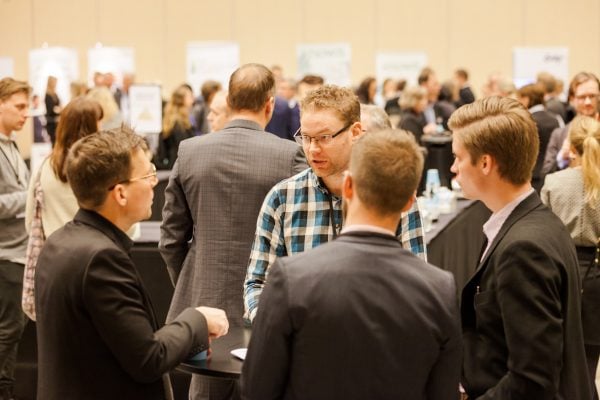Embracing Disruption
May 02, 2019 • copperberg • Parts Pricing and Logistics
Now in its seventh year, content at The Spare Parts Business Platform continues to reflect the changing trends in what is for the service sector a strong source of revenue. But with disruptive technologies such as Aritificial Intelligence and blockchain starting to have an impact on the supply chain – along with Brexit - what did delegates take away from this year’s gathering in Stockholm? Mark Glover finds out more...
Skype, the VOIP service released in 2003, the pre-cursor to video-calls over the web is now taken for granted. A true game changer, the application means business meetings can take place in one room with worldwide attendees interacting in real-time; friends and family can keep in touch from both sides of the world. In technological terms, it was disruption on a huge scale. It seemed appropriate then that one of the creators of Skype, Jonas Kjellberg, should present a keynote at this year’s Spare Parts Business Platform.
Delegates packed into the main conference room to hear how the Swedish entrepreneur disrupted and continues to disrupt in pursuit of constant innovation. Billed as part of the event’s Service Mastery Day, Kjellberg’s hour-long presentation urged delegates to bring this culture of disruption to their business framework. Once the cash cow of the service sector, spare parts has perhaps remained stagnant in its outlook and, Kjellberg, suggested disruptive elements such as AI, drones and 3D printing should be welcomed and embraced.
However, political upheaval through Brexit is creating a type of disruption a long way from the technological and business sort that drives innovation. Indeed, as I write this the EU has just agreed an extension to the UK’s departure, pushing the exit day back to 31 October. A major thread of negotiation and debate is the movement of goods in the EU and any tariffs imposed will inevitably have an affect on the supply chain. In a fascinating presentation towards the end of the first day, Lars Karlsson, CEO and Managing Director at KGH Global Consulting and an expert in customs warned delegates about the impact that the UK’s withdrawal could have on logistics. Karlsson, who was commissioned by the European Parliament Constitutional Committee to suggest possible border-solutions post-Brexit shared his thoughts on the impact of import and export between the EU and UK. Of course, while businesses are doing everything they can to prepare for all Brexit outcomes, until politicians come to an agreement we can still only speculate on what sort of mark Brexit will leave.
One future trend that could impact positively on the supply chain is 3D printing and on day two of the conference, Atanu Chaudhuri from Aalborg University – and recent guest on the Field Service Podcast – presented case studies from two Danish manufacturers to delegates on selecting suitable spare parts for 3D printing (or additive manufacturing to give it its other term). Adopted within the medical, automotive and aerospace sectors additive manufacturing is yet to truly take-off in service, due in-part to the lack of a solid business case being waved in front of a perhaps cynical industry. However, as part of Atanu’s presentation, Mads Blaabjerg Uhre from Nilfisk, a supplier of professional cleaning equipment, and an advocate of 3D printing took part in a far-reaching Q&A on the subject, which may have persuaded some of those in the audience to re-consider their view on the subject.
Elsewhere on day two, sessions straddled warehouse management, digitization and stock optimisation. On the latter, Andrea Capello, Head of Parts BU at Ariston Thermo, a producer of thermic comfort products for commercial and industrial use, was able to share some of the guidelines that he uses to check stock-level by cluster and some of the tools used in this process. He outlined the importance of having a clear understanding of stock-balance, including inventory and location and affirmed that only then can you be fast and responsive to the customer.
Delegates left the two-day event enriched with new ideas, contacts and an accurate overview of where they and their business sit in the spare parts world. Thomas Igou, Editorial Director at Copperberg, the organisers behind the event, said this year’s conference had been a success and he looked forward to the next gathering. “With over 150 participants from all corners of Europe,” he said, “and across the manufacturing sector, 12 partners including the leading solutions providers in the sector, and high profile speakers that included the co-founder of Skype, the event was two intense days of knowledge sharing. I look forward to the next edition in February 2020, this time in Germany.”
A year is a long time in field service and 2020’s Spare Parts Business Platform, I’m sure, will reflect the trends of a dynamic and constantly moving industry.
Skype, the VOIP service released in 2003, the pre-cursor to video-calls over the web is now taken for granted. A true game changer, the application means business meetings can take place in one room with worldwide attendees interacting in real-time; friends and family can keep in touch from both sides of the world. In technological terms, it was disruption on a huge scale. It seemed appropriate then that one of the creators of Skype, Jonas Kjellberg, should present a keynote at this year’s Spare Parts Business Platform.
Delegates packed into the main conference room to hear how the Swedish entrepreneur disrupted and continues to disrupt in pursuit of constant innovation. Billed as part of the event’s Service Mastery Day, Kjellberg’s hour-long presentation urged delegates to bring this culture of disruption to their business framework. Once the cash cow of the service sector, spare parts has perhaps remained stagnant in its outlook and, Kjellberg, suggested disruptive elements such as AI, drones and 3D printing should be welcomed and embraced.
However, political upheaval through Brexit is creating a type of disruption a long way from the technological and business sort that drives innovation. Indeed, as I write this the EU has just agreed an extension to the UK’s departure, pushing the exit day back to 31 October. A major thread of negotiation and debate is the movement of goods in the EU and any tariffs imposed will inevitably have an affect on the supply chain. In a fascinating presentation towards the end of the first day, Lars Karlsson, CEO and Managing Director at KGH Global Consulting and an expert in customs warned delegates about the impact that the UK’s withdrawal could have on logistics. Karlsson, who was commissioned by the European Parliament Constitutional Committee to suggest possible border-solutions post-Brexit shared his thoughts on the impact of import and export between the EU and UK. Of course, while businesses are doing everything they can to prepare for all Brexit outcomes, until politicians come to an agreement we can still only speculate on what sort of mark Brexit will leave.
"Once the cash cow of the service sector, spare parts has perhaps remained stagnant in its outlook..."
One future trend that could impact positively on the supply chain is 3D printing and on day two of the conference, Atanu Chaudhuri from Aalborg University – and recent guest on the Field Service Podcast – presented case studies from two Danish manufacturers to delegates on selecting suitable spare parts for 3D printing (or additive manufacturing to give it its other term). Adopted within the medical, automotive and aerospace sectors additive manufacturing is yet to truly take-off in service, due in-part to the lack of a solid business case being waved in front of a perhaps cynical industry. However, as part of Atanu’s presentation, Mads Blaabjerg Uhre from Nilfisk, a supplier of professional cleaning equipment, and an advocate of 3D printing took part in a far-reaching Q&A on the subject, which may have persuaded some of those in the audience to re-consider their view on the subject.
Elsewhere on day two, sessions straddled warehouse management, digitization and stock optimisation. On the latter, Andrea Capello, Head of Parts BU at Ariston Thermo, a producer of thermic comfort products for commercial and industrial use, was able to share some of the guidelines that he uses to check stock-level by cluster and some of the tools used in this process. He outlined the importance of having a clear understanding of stock-balance, including inventory and location and affirmed that only then can you be fast and responsive to the customer.
Delegates left the two-day event enriched with new ideas, contacts and an accurate overview of where they and their business sit in the spare parts world. Thomas Igou, Editorial Director at Copperberg, the organisers behind the event, said this year’s conference had been a success and he looked forward to the next gathering. “With over 150 participants from all corners of Europe,” he said, “and across the manufacturing sector, 12 partners including the leading solutions providers in the sector, and high profile speakers that included the co-founder of Skype, the event was two intense days of knowledge sharing. I look forward to the next edition in February 2020, this time in Germany.”
A year is a long time in field service and 2020’s Spare Parts Business Platform, I’m sure, will reflect the trends of a dynamic and constantly moving industry.





















 Field Service News is published by 1927 Media Ltd, an independent publisher whose sole focus is on the field service sector. As such our entire resources are focused on helping drive the field service sector forwards and aiming to best serve our industry through honest, incisive and innovative media coverage of the global field service sector.
Field Service News is published by 1927 Media Ltd, an independent publisher whose sole focus is on the field service sector. As such our entire resources are focused on helping drive the field service sector forwards and aiming to best serve our industry through honest, incisive and innovative media coverage of the global field service sector.
Leave a Reply